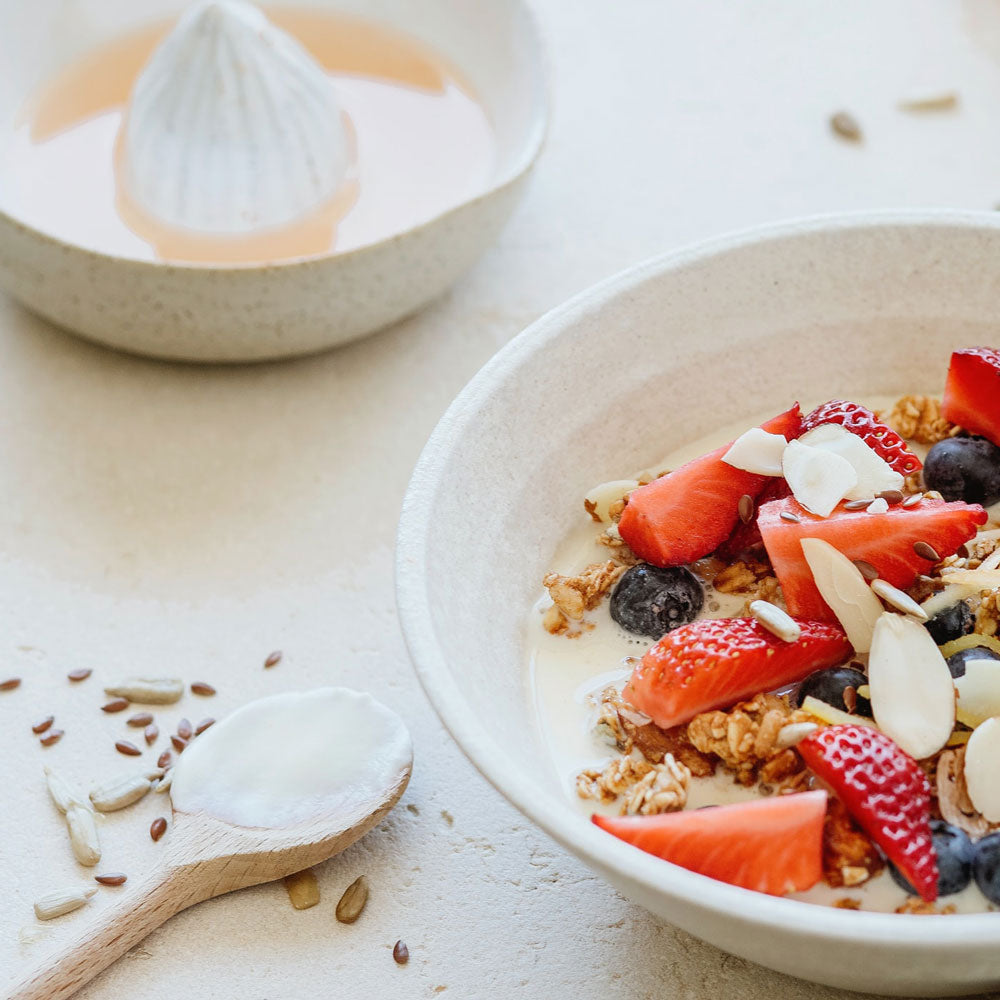
Share
Do Probiotics actually make a difference? | Everything you need to know about gut health
Probiotics are ‘good’ or ‘friendly’ bacteria and yeasts that help our immune systems to strengthen while also maintaining our digestive systems. These bacteria are commonly known to be in yogurt but other foods contain probiotics as well, including fermented vegetables such as pickles and gherkins.
Probiotics can also be taken as a supplement that is easily found in most drug stores or supermarkets. For those wanting a consistent dose of probiotics, supplements may even be more useful than food sources. Manufacturers do not have to (and therefore usually do not) specify the volume of the dose of probiotics in their food products.
Lactobacillus and Bifidobacterium
The ‘good’ bacteria in probiotics are generally either Lactobacillus or Bifidobacterium. These bacteria are usually freeze-dried so that they remain alive. Once swallowed, they are warmed up in your digestive system and eventually become fully active.
Note: While they are freeze-dried, the supplements do have a sell-by date which should be noted. Another thing to be aware of is the differing dosages between each supplement.
Do We Need Probiotics?
In a perfect world, you would not need probiotics because your body’s gut already contains some ‘friendly’ bacteria. But not everyone has the perfect amounts and adding them to the diet can help fight harmful bacteria in our intestines and regulate the immune system.
Our bodies can sometimes go through a period of imbalance. This imbalance of microbes can cause us to experience diarrhea and other health problems. Probiotics help restore this balance via the release of protective substances that stimulate the immune system to dispose of any harmful bacteria in the gut. Therefore, they are commonly used to get rid of symptoms such as gas, bloating and constipation — symptoms are often associated with gastrointestinal illnesses.
There are plenty of benefits to adding a probiotic to your daily regimen. When taken as a supplement, probiotics may help reduce the number of colds you experience in the year! Those that suffer from Irritable Bowel Syndrome (IBS), may find that probiotics help ease these symptoms. Some probiotic takers have found that they can help keep ulcerative colitis in remission (a period of time when you do not experience disease activity.) Plus, they help prevent Crohn’s disease from relapsing and getting worse.
While there are a lot of studies showing the positive impact that probiotics can have on the conditions described above, there is also some newer research showing probiotics to have helped with the following:
- Preventing and treating yeast infections
- Preventing and treating urinary tract infections
- Lactose intolerance
- Skin conditions such as eczema
- Treating certain stomach and respiratory infections, especially in children
- Treating allergies and asthma
- Decreasing inflammation, such as from rheumatoid arthritis
The common dosage differs between each supplement and the medical needs of the person, however the common dosage for adults ranges from five to 10 billion colony-forming units per day.
What Are Prebiotics?
Prebiotics are food ingredients that cannot be digested by humans but become food for the probiotics. They are used to increase the amount of ‘good’ and ‘friendly’ bacteria in the gut, as well as aiding in the digestion process. They also play a part in stimulating the production of valuable vitamins.
While all prebiotics are fibers, not all fibers are prebiotics! Galactooligosaccharides (GOS) are the most complex form of prebiotics. The other form of prebiotics is Fructooligosacharides (FOS). These fibers belong to a group of specific nutrient fibers that help produce the ‘good’ bacteria in the gut.
Prebiotics can naturally occur in many foods such as some whole grains, fruits, and vegetables. Bananas, onions, leeks, Jerusalem artichokes, asparagus, and garlic all contain prebiotics.
Like probiotics, they can also be consumed via nutritional supplements. However, it is important to stick to the recommended dosages as consuming large doses of prebiotics can result in abdominal discomfort, gas, and bloating.
What is the Difference Between Probiotics and Prebiotics?
The main difference between probiotics and prebiotics is that the former is alive and active whereas the latter is not.
Probiotics are bacteria in the gut. Prebiotics are the indigestible, insoluble fibers that the probiotics feed off to do their job of restoring the immune system, balancing the gut bacteria, and increasing the population of the ‘healthy’ bacteria.
Unlike probiotics, prebiotics are highly stable and unaffected by heat, the body’s enzymes, or its acidity. Reaching your gut intact — without being digested, destroyed, or absorbed — they travel through the digestive system. Prebiotics are found in carbohydrates, fruit, and vegetables. They increase the production of ‘good’ bacteria in your gut without feeding any bad microorganisms or pathogens along the way.
Probiotics are strains of bacteria which are found in fermented foods. Prebiotics can easily reach the gut unaltered, whereas probiotics must be freeze-dried to make it to the gut alive and in sufficient numbers because they are highly unstable.
Benefits of Vegan Probiotics
There are many benefits to choosing a vegan probiotic supplement.
- Gut and Digestive Health: Vegan and plant-based probiotics help to break down the food we consume and therefore speed up our digestion process. This in turn can then help reduce constipation as well as symptoms of Crohn’s disease and IBS.
- Regularity: Vegan probiotics can help maintain a regular toilet routine, as well as keeping stool consistent. (There is nothing that disrupts our days more than irregular and sometimes uncontrollable bowel movements!)
- Body Composition: Vegan probiotics can help manage diabetes by improving glycaemic control and lipid metabolism. They can reduce the risk of an individual suffering from obesity which, in turn, can also help improve one’s mental health by reducing their overall anxiety and depression.
- 4. Immune Health: Plant-based probiotics can help prevent an imbalance in the gut bacteria. Maintaining ‘good’ bacteria gut levels is important to help prevent pathogens and harmful bacteria from affecting the immune system and the body. A lower immune system can reduce the body’s ability to fight further infection and disease.
Vegan Probiotics Advantages vs Regular Probiotics
Many people choose vegan probiotics because they help prevent the lives of animals from being damaged and exploited.
Plus, plant-based probiotics are just as easy to find as the most common non-vegan sources such as yogurt. Many people enjoy getting their probiotics from fermented foods such as sauerkraut. (Cabbage is also rich in potassium and vitamin C!)
For those that prefer to get their probiotics in supplement form, vegan options are readily available. This makes it ideal for vegetarians and vegans to continue their preferred lifestyle.
If you're ready to make the jump, check out our all-new Vegan Probiotic Gummies, they're not just delicious—they aid gas, bloating, and ease bowel movement. Your gut will thank you. 😉
When to Take Probiotics?
The timing of taking probiotics can affect the volume of probiotics you receive from your capsule. However, timing doesn't necessarily refer to the morning hours or evening hours. The time on the clock actually matters very little. The focus on timing should be around mealtimes.
Many studies show that taking probiotics at the end of a meal may help to reduce the symptoms. This is the time when your gut, stomach, and digestive system, in general, are least acidic because your body has not yet begun to produce stomach acid in large quantities to digest your food.
Therefore, probiotics can get to your gut easier which ensures that you get the most benefits out of the ‘good’ bacteria.
Those taking enteric-coated probiotic capsules or delayed-release capsules don't have to be as picky with timing. These probiotics are more likely to survive stomach acid and so the exact timing is less important.
Ideally, you want to take the live strain of probiotics 20 minutes after eating, first thing in the morning, or last thing at night. This will help more of the probiotics to make it into the large intestines where they will have the most benefits. Soil-based probiotics should be taken with food to maximize their impact.
Also, some people may experience loose stools in the first few days of taking probiotics. While this symptom does not affect everyone and generally only lasts a few days, it is worth noting.
You can take probiotics with prebiotics. This means that you are adding the ‘good’ bacteria into your gut (via the freeze-dried probiotics), as well as stimulating the increase in production and growth of the ‘good’ bacteria that is already in your gut.
Probiotics and Antibiotics
Some studies suggest that taking probiotics while also taking antibiotics help prevent getting diarrhea caused by the antibiotic.
Antibiotics are essentially non-selective when killing harmful bacteria and therefore they can also deplete the amount of ‘good’ bacteria in your system.
While the benefits of taking antibiotics definitely outweigh the side effects of loss of appetite, bloating, nausea, indigestion, abdominal pain, fatigue, diarrhea, these symptoms can be uncomfortable. Therefore, taking a probiotic with an antibiotic can help reduce the overall damaging effects of antibiotics — leaving them to kill harmful bacteria while the ‘good’ bacteria grow.
Probiotics Side Effects:
- Unpleasant digestive symptoms such as a temporary increase in gas and bloating. Those taking yeast-based probiotics may also experience constipation and feeling more thirsty.
- Headaches can be caused by amines exciting the central nervous system and changes in blood flow.
- Allergies or intolerances to probiotics could be due to the supplement's ingredients, some contain lactose, sugar, or soy.
- Some may notice an increase in histamine levels causing redness and swelling.

